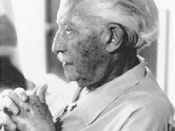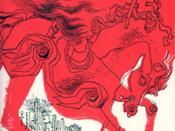J.D. Salinger's "The Catcher in the Rye" portrays a troubled teen in New York City. Over the few days the novel depicts, the boy displays his critical and unhealthy mindset. Eventually he has a mental breakdown. Through psychoanalysis of Holden Caulfield, one may suggest that Allie's death, social development, and an identity crisis are large contributing factors in Holden's mental breakdown.
Allie Caulfield is an important person to Holden and his death affects him greatly. In response to his brother's passing, Holden attempts to recover by using defense mechanisms as a shield against reality. The concept of defense mechanisms strategies for avoiding or reducing threatening feelings such as fear and anxiety" (Strickland 182). While defense mechanisms are normal, healthy coping tools, they may grow to be problematic when their usage becomes habitual. Holden appears to use several defense mechanisms in response to Allie's death. Additionally, he implements them into his daily activities.
One of the defense mechanisms Holden employs is denial. Denial, as defined by Plotnik, is "refusing to recognize some anxiety-provoking event or piece of information" (437). In Holden's case, he does not fully accept Allie's death; instead, he subconsciously remains in delial to avoid the pain associated with this loss. Although he tells Phoebe, "I know he's dead! Don't you think I know that?" (Salinger 171) Holden's reactions do not reflect his claim. He speaks of and to Allie as though he is still alive. While acknowledging his brother's death on the surface, Holden does not fully accept it. For instance, as he stumbles along the sidewalks of New York City subsequent to visiting Phoebe, he begins speaking to Allie, asking for his brother to keep him safe. By asking Allie for help, Holden demonstrates his belief that Allie is present, not dead. At an earlier...



Not bad
I really like this essay and it portrays well the situation that holdne finds himself in throout the book. well written and easily comprehensible. Very nice. Regards.
1 out of 1 people found this comment useful.